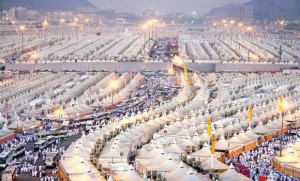Hajj: A manifestation of human unity
 Hajj plays a significant role in strengthening Muslim unity and solidarity as millions of Muslim faithful gather in Makkah and other holy sites wearing the same dress and reciting the same slogan — Labbaik Allahuma Labbaik, Labbaik La Shareeka Laka Labbaik (O Allah, here I am answering your call and I bear witness that You have no partners).
Hajj plays a significant role in strengthening Muslim unity and solidarity as millions of Muslim faithful gather in Makkah and other holy sites wearing the same dress and reciting the same slogan — Labbaik Allahuma Labbaik, Labbaik La Shareeka Laka Labbaik (O Allah, here I am answering your call and I bear witness that You have no partners).
Hajj teaches the faithful lofty values, principles and objectives upon which Islam molds the qualities and character of an individual.
It is the climax of a Muslim individual’s spiritual life and an embodiment of Islamic unity, which is based on a brotherhood in faith that towers above the narrow considerations of race, nationality, color or language.
Hajj is a marvelous exercise for believers to strengthen their faith as they focus fully on activities that make Allah happy.
They rise above day-to-day preoccupations and casts off what men ordinarily cherish.
This also reflects in the deep symbolic meaning of the clothes they wear during ihram (the state of consecration).
It symbolizes his inner state, which makes him leave behind his family, home, wealth, position and everything dear to him.
Millions of Muslim faithful meet in Makkah and other holy sites to live a spiritual life on a special level, enacting a rite that exposes the exalted value of Islam and where equality, brotherhood and unity among the faithful is embodied, where response to the call of God comes before any other call: “And proclaim among men the pilgrimage: They shall come to you on foot and upon every lean beast; they shall come from every deep ravine.” (Qur’an 22:27)
The Hajj pilgrimage is a unique gathering that gives the pilgrims an experience unavailable to them at home in their usual life. There is an exercise of strict self-discipline and control where sacred things are revered and the life of even plants and birds is made inviolable. “And he that venerates the sacred things of God, it shall be better for him with his Lord…” (Qur’an 22:30); “And he that venerates the Symbols of God, it surely is from devotion of the heart” (Qur’an 22:32); “And when We made the House (in Makkah) a resort for men and a sanctuary…” (Qur’an 2:125)
Hajj offers a rigorous training in self-control: “The pilgrimage is in the well-known months. He that undertakes the duty of the pilgrimage during them must abstain from coition, ungodliness and acrimonious dispute, and whatever good you do, Allah is aware of it. Take provision (from it) for yourselves, for the best provision is piety.” (Qur’an 2:197) “Take provision” indicates that the effects of this experience should extend to the conduct of the Muslim in his normal life afterward, and that he should live and conduct himself by the values that manifest piety, “the best provision.”
P. K. ABDUL GHAFOUR | Arab News Staff
Published — Wednesday 9 October 2013
- October 09, 2013
- Comments are off
